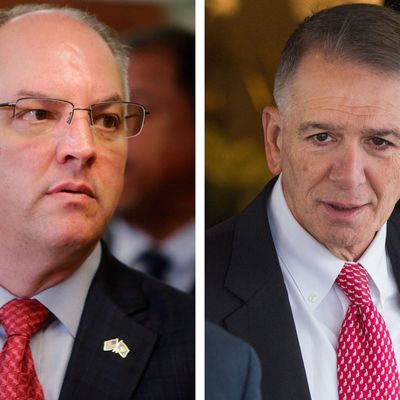
If you’ve followed the criminal-justice-reform issue over the years, you probably know that much of the action — and probably the most important types of action — are occurring at the state level, often with even-more bipartisanship than you’ve seen in Washington on that rare subject where bipartisanship hasn’t become extinct. Unsurprisingly, there are, in state politics, counterparts to atavistic opponents of reform like U.S. Senator Tom Cotton, who likes to say America has an “under-incarceration problem.” And one of them is bidding to become Louisiana’s next governor in elections this fall, as Daniel Nichanian explains:
Louisiana overhauled its criminal legal system in 2017 and soon shed its status as the country’s top incarcerator. That year, a package of sweeping reforms expanded alternatives to prison and reduced mandatory minimums. The Republican legislature adopted these measures by large majorities, and Democratic Governor John Bel Edwards then signed them into law.
Despite this bipartisan pedigree, some of the state’s most prominent Republican officials are foes of criminal justice reform and use them to attack Edwards, who is up for re-election this fall. One of his main challengers, GOP Representative Ralph Abraham, is running firmly against the policies, which he says have “opened the gates” to crime.
Like Cotton, Abraham was part of a minority of Republican members of Congress to vote against last year’s First Step Act, the package of prison reforms with a few key sentencing reforms added, which Donald Trump grudgingly backed at the last minute and then signed (now you’d think it was all his idea). You have to really be convinced of the demagogic power of law-and-order posturing to get to the right of our demagogic law-and-order president. But Abraham tried:
“We’ve seen the negative effects this kind of criminal rights activism is having in Louisiana, and I’d hate to inflict that mistake on communities elsewhere in our country,” he said in a statement. Neither his campaign nor his office answered a request for comment on which specific reforms he opposes, and on what negative effects he sees.
And Abraham is not alone in Louisiana, in his position or his vague rationale for it:
His words echo a 2018 op-ed written by U.S. Senator John Kennedy and state Attorney General Jeff Landry, who cite two cases of recidivism as their evidence for the ill effects of Louisiana’s reforms, a familiar strategy that Adam Johnson of The Appeal has dubbed “emotionally charged anecdotes and a lack of meaningful statistics.”
“Before the ink was barely dry, critics of the reforms began denouncing them with overinflated claims and anecdotal evidence,” Daniel Erspamer, chief executive of the Pelican Institute, a conservative think tank that supported the 2017 laws, told the Political Report.
“While it’s certainly too early to claim ultimate success or failure, the actual data suggests progress in reducing crime and recidivism while saving scarce taxpayer dollars,” he added, pointing to early data that finds that the rate of reincarceration is lower than it was before the laws went into effect.
Abraham is generally regarded as Edwards’s most formidable Republican opponent in Louisiana’s off-year governor’s race. Another Republican, wealthy business executive Eddie Rispone, is also viable; his position on criminal-justice reform is unclear. Under Louisiana’s “jungle primary” system, all candidates will be on the ballot together on October 12, and if no one wins a majority of the vote, a general election will be held on November 16 between the top-two finishers, regardless of party. Edwards is an old-school social-conservative Democrat who opposes gun control and signed legislation outlawing abortions (without exceptions for rape and incest) when a fetal heartbeat can be detected. But his support for criminal-justice reform, along with his expansion of Medicaid and his progress in dealing with the fiscal mess left by his Republican predecessor Bobby Jindal, have been popular among Democrats and swing voters alike, making Edwards a clear if narrow favorite for reelection in this heavily Republican state.
If Abraham can force a second round against Edwards (and isn’t spent into a third-place finish by Rispone), then there will probably be more racially tinged law-and-order talk from the Republican than Louisianans have heard since David Duke was running for governor back in the day. That’s what you do when your only weapon is fear.






























